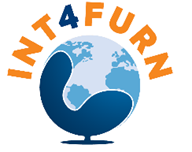
Project number: 2022-1-TRO1-KA220-VET-000089008
Project Coordinator : Assoc. Prof. Dr. Alper GÜZEL
Project Website : http://www.int4furn.eu
INT4FURN PROJECT
The furniture industry is a labour-intensive and dynamic sector dominated by small and medium-sized enterprises (SMEs) and micro firms. EU furniture manufacturers have a good reputation worldwide thanks to their creative capacity for new designs and responsiveness to new demands. The industry is able to combine new technologies and innovation with cultural heritage and style, and provides jobs for highly skilled workers. Furniture sector in EU employs around 1 million workers in 130000 companies generating an annual turnover of around €96 billion. EU furniture manufacturers are also global trendsetters in designs and world leader in the high-end segment of the furniture market. In 2016, the EU imported furniture worth €15.3 billion from outside the EU, and exported slightly less —15.1 bn — to non-EU countries. China’s penetration into the EU market is growing rapidly and it is now the largest furniture exporter to the EU, accounting for over half of total furniture imports to the EU. Italy and Germany are main exporters with 48% of the total EU Member States furniture exports and almost 40% of export to non-EU countries are made to USA and Switzerland.
Recent crises such as Covid19 and Russian attack on Ukraine hit severely the furniture sector and the sector faces a significant drop in the number of companies, jobs, and turnover. The main challenges are competition, innovation, structural problems, and trade constraints. The main opportunities to overcome these challenges ahead lie in Investment, Research, Access to new markets and creating Synergies. – EU furniture manufacturers are recognised worldwide for their quality and design. This creates opportunities for the sector to further seize other markets, in particular in high-end segments and emerging economies.
Furniture sector Micro-SMEs in the EU struggle to internationalise their business and only 25% of EU-based micro-SMEs export at all and an even smaller portion export beyond the EU. The Commission aims to help European micro-SMEs face competition, access foreign markets, and find new business partners abroad. Since it provides various advantages, there are also internal and external barriers faced by micro-SMEs in internationalisation. It has become very important in order to eliminate these obstacles as much as possible and to ensure the internationalisation of micro -SMEs. For ensuring a healthy and consistent internationalisation strategy towards micro-SMEs, a total training and supportive activities are needed. Project will focus on the above topics, and it will do so by providing training to assist the micro-SMEs in furniture sector.
PARTNERS
|
P. No |
Partner Organisation |
|
P1 |
Gazi University, Ankara Türkiye (Coordinator) |
|
P2 |
Institute of Entrepreneurship Development (IED), Larissa, Greece |
|
P3 |
Internationale Arbeidsvereniging (ILA) |
|
P4 |
Ankara Ticaret Odası (ATO), Ankara Türkiye |
|
P5 |
Instituto Ikigai, Asociación Española Para El Emprendimiento Y El Desarrollo Personal Y Profesional (IKIGAI) Zaragoza, Spain |
|
P6 |
Instituto Politecnico De Santarem (IPSantarem) Santarem, Portugal |
|
P7 |
Huemaniser OÜ, Tallinn, Estonia |
OBJECTIVE 1:
To support participating micro-SMEs in VET and further training activities in the acquisition and the use of knowledge, skills and qualifications related to internationalisation in furniture sector.
OBJECTIVE 2:
To develop an ECVET compliant dedicated internationalisation course including curriculum, training content and materials that will allow target groups to learn (remotely) at their own place.
OBJECTIVE 3:
To develop an innovative self-assessment tool for measuring the readiness for entering in global markets and identifying required competences
OBJECTIVE 4:
To support curriculum and course with instructive engaging training videos and training materials, hosted on Digital Internationalisation Learning Hub.
OBJECTIVE 5:
To develop innovative online and mobile ICT-based tools for supporting training course.
OBJECTIVE 6:
To improve the co-operation between institutions and business, in other words, between theory and practice.
OBJECTIVE 7:
To reduce the risk of failure of the micro-SMEs in furniture sector in entering international markets.
OBJECTIVE 8:
To raise awareness of micro-SMEs and young people about entering new markets and trading in an international environment
